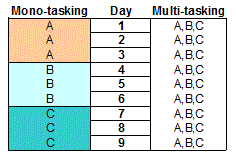In fact, multitasking simply results in delays, disruptions and inefficiencies.
Does it matter whether you do one after the other (mono-tasking) or you multi-task and do a bit of each one each day?
While things are not usually this simple it is enlightening to see the difference:
Suppose you have three tasks (A, B and C) that each take three days to do (a total of nine days work).
Multitasking will result in all three tasks being finished on the ninth day.
By mono-tasking two of the three tasks get completed sooner!!!
- A will be finished on the third day - giving six additional days benefit
- B on the sixth day - giving three additional days benefit
- C on the ninth day.
In practical terms there are other factors that come into play which may or may not be significant. There are many more changeovers between tasks undertaken with a multitasking approach. Sometimes such changes consume additional time and effort.
On the other hand, one may not have the opportunity to use a full mono-tasking approach. But it is wise to maximise the use of mono-tasking wherever possible.
One way to achieve a higher proportion of mono-tasking is to delay starting some of the tasks. In the above example of mono-tasking B is not started until Day 4 but is finished at the end of Day 6 - three days earlier than the multi-tasking result.
Worth thinking about, even if it is contrary to common wisdom.

No comments:
Post a Comment